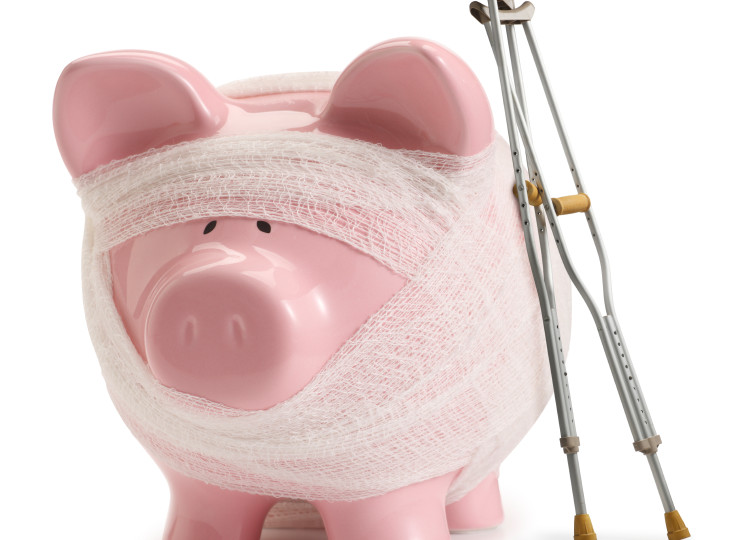 Okay, it wasn’t really a bus. It was a sedan –but the implications are the same, and the metaphor sticks.
Okay, it wasn’t really a bus. It was a sedan –but the implications are the same, and the metaphor sticks.
So I’ve decided to write about some of the lessons I’ve learned since March 20th, 2013, when I was hit by a car whilst riding my bike. This will take a while, since so much recovery time produced so many lessons. And, I’m taking this time to recount the lessons, not so that you can avoid these problems on the statistically improbable instance that you will be hit by a bus, literally, but you know, so you can keep these things in mind for any hit-by-a-bus-like bumps you come across, as a business owner, self-employed person or artist.
Know Your Insurance / Have Insurance
When you are a struggling entrepreneur, or artist, or fledgling free-lancer, it sometimes seems like insurance is an extra expense that you can put off until your income is more stable. And really, we all hope that it is a waste of money. But on the rare occasion, it is not a waste of money, but a well planned safety net that swoops in and helps us through some of our worst moments.
Three days after my accident, I was sitting at my folks home in North Van, in pain and irritated by their concerned doting on me and my thoughts were: I’m so thankful I purchased insurance! I’ll just cash that puppy in and take a few weeks off to recouperate and use the insurance money to pay my newly part-time contractor to work full-time hours. Whew, right?
Wrong. Apparently, I had bought some insurance, but not the right kind of insurance. In my mind, I had purchased Extended Health, Travel, and Disability in one payment package. So I didn’t notice that I only actually had two insurance policies. Boo! When I contacted my broker by email, he told me that I was planning on signing the papers the following month (after we had met) and neither of us had followed up.
Lesson #1 Know what kind of insurance you have. Ask your broker repeatedly if you don’t understand or don’t remember. Write short-hand on your documents what is covered and keep them filed in an easy to locate place. Believe me, a brain injury can wreak havoc on your “special spots”.
Here’s my cheat sheet:
Extended Health Insurance covers some of the incidentals that MSP doesn’t, and believe me, there are MANY things basic health care does not cover, and often you must wait years until ICBC settles or your case goes to court. My accident was March, 2013 and my court date is June 2016. In some ways that length of time is ideal, but not for covering any medical expenses. Some lawyer firms will advance you some money based on expenses, but many do not.
Disability Insurance covers when a person cannot work for extended periods of time. This insurance is geared to replace income and is great for self-employed people, or people who want insurance above and beyond what their employee benefits covers.
(If you are an employee, you will have short-term disability that pays out for 3-4 months or EI for 17 weeks, after that, you go on CPP Disability, which is the kind of insurance that you get when you are not expected to go back to work)
Critical Illness Insurance is for if you get serious illness diagnosis, like cancer, MS, stroke, etc.. 30 days of being diagnosed, you will get a lump sum payout and you can decide how you use that money.
In my case, I was fortunate to have family to help cover some of my expenses. I also had a Stop Loss insurance on my Extended Health Insurance, which I would have used to cover $3000 in medical bills, had I known it was available before the deadline. Also noteworthy was the RBC line of credit insurance. They paid the interest payments on my line of credit until I went back to work part-time. I believe most credit cards have this feature too, although I didn’t have a balance.
Unless you believe you have enough money to cover your living and recovery expenses for a good year, or a family who will step up, I would recommend getting on top of your insurance. Especially if you have children.
Lesson #2: Find a Great Insurance Broker. What do I mean by a “great” Insurance Broker? One who checks in with you. I bought my insurance in 2010, and have NEVER heard from him. A good Insurance Broker will check in with you annually to make sure everything is up-to-date.
So guess what? First-ish thing I did was find a new one. I know one from one of my networking groups, and guess what else? She came to check in with me in my early days of recovery. She’s been through a life-altering illness and is also self-employed, and that gives her extra empathy and perspective that I found extremely helpful.
Reach out to your broker and make sure you are protected. And if you require a referral, please ask your friends, or send me an email, I’d be happy to refer mine to you.
Categories
Submit a Comment